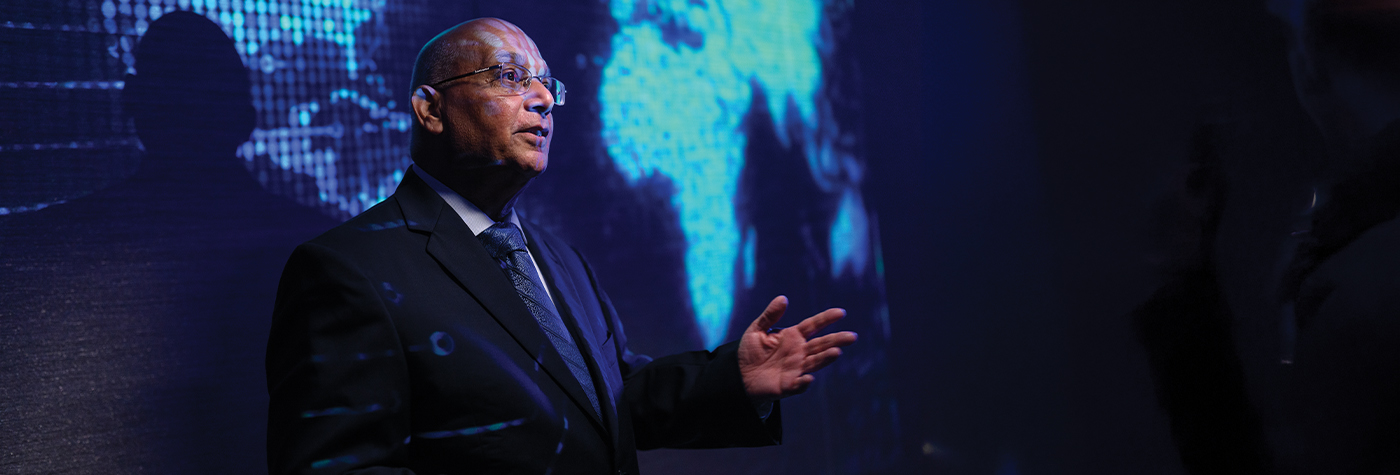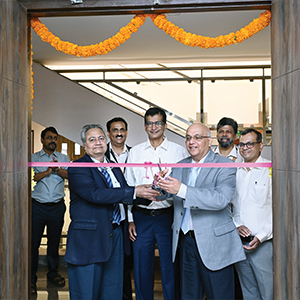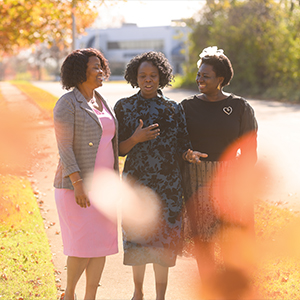Beyond Borders

THIS GLOBAL PLATFORM PROPELS CANCER
RESEARCH AND FOSTERS COLLABORATION
A collaborative effort started at the UK Markey Cancer Center is advancing cancer education, research and mentorship on a global scale.
The Global Cancer Consortium aims to nurture a collaborative environment that connects participants from around the world through conferences, courses, seminars and workshops. Participants can learn from experts, interact with peers and explore diverse perspectives.
“The consortium offers a unique platform for collaboration in education and research,” said Vivek M. Rangnekar, PhD, the consortium’s chair and founding faculty member. “By providing accessible and high-quality educational and research opportunities, we empower the next generation of cancer researchers and clinicians and ultimately enhance cancer care worldwide.”
A Global Classroom
The Consortium’s educational programs include:
- Online courses: Self-paced online courses cover a range of topics, including cancer biology and advanced treatment techniques.
- Seminars: Innovative interactive seminars provide opportunities for in-depth discussions and knowledge sharing.
- Workshops: Training workshops combined with mentored research projects allow participants to apply their learning and develop practical skills.
- Training programs: Specialized training programs, such as precision oncology and cardio-oncology, cater to specific needs.
Beyond formal education, the consortium fosters mentorship and collaboration among its participants. Mentorship programs connect students and early-career researchers with experienced professionals, who provide guidance and support. Collaborative research projects allow participants to work together on cuttingedge initiatives.

International Network
Markey formed the consortium in early 2020 with:
- Manipal Academy of Higher Education, Manipal, India
- Saroj Gupta Cancer Centre and Research Institute, Kolkata, India
- Tata Memorial Centre, Mumbai, India
- Mayo Clinic Cancer Center,
U.S. Other institutions have since signed on, including:
- Brown University Cancer Center, U.S.
- China Medical University, Taiwan
- University of Kansas Cancer Center, U.S.
- Institute of Cancer, Sao Paulo, Brazil
The consortium operates through a network of regional chapters in North America, Europe, South Asia and East Asia. Each chapter has its own scientific focus and research training activities. Chapter operations and finances are autonomous but philosophically aligned. All faculty and trainees at participating institutions can attend and participate in consortium activities.
Prepared for the Future
As the consortium continues to grow and evolve, it is poised to play an even more vital role in addressing the global cancer burden, said Dr. Rangnekar, who is also Markey associate director, professor and Alfred Cohen Endowed Chair at the College of Medicine.
The concept has attracted international attention. Dr. Rangnekar will chair a session on the consortium’s global partnership model at the 2025 Asia- Pacific Association for International Education. The session will also feature Tim Barnes, UK’s executive director of international partnerships and research, Liang-Yo Yang, Dean of Global Affairs and Medicine at CMU Taiwan, and Naveen Salins, MD, dean of research at Manipal.
MARKEY PARTNERS WITH
CANCER CENTER IN UKRAINE
In 2024, Markey formed a strategic partnership with the Kyiv Regional Oncology Dispensary (KROD) in Ukraine. The collaboration will focus on promoting cancer prevention and treatment, fostering research collaboration, and facilitating personnel exchanges for training and education.
Markey researcher Vivek M. Rangnekar, PhD, played a leading role in bringing the two centers together. One of his goals is to establish a training program for private physicians in Ukraine.
“Many cancer patients in Ukraine receive initial treatment at hospitals but return to their communities for follow-up care,” Dr. Rangnekar said. “Training private physicians in oncology will help ensure these patients have access to quality care closer to home.”
INCREASING CERVICAL CANCER SCREENINGS
FOR BLACK WOMEN
Black women in the U.S. get cervical cancer screenings at lower rates than their white counterparts. College of Nursing Assistant Professor Adebola Adegboyega, PhD, RN, wants to better understand the perceived barriers to screening. She also wants to know if there are differences in screening patterns between U.S.-born Black women and African-born Black women living in Kentucky.

Dr. Adegboyega received a five-year grant from the National Cancer Institute in 2020 to study these barriers and facilitators of cervical cancer screening among Black women in the Commonwealth. Her research aims to reduce health disparities in underserved populations by increasing screening rates and improving outcomes.
Participants in the study receive one hour of cervical health education. They then get an HPV testing kit that allows them to collect a sample at home and send it in for testing. The kit is similar to an at-home colon cancer test kit. Those who test positive for HPV receive additional information for follow-up care.
Much of Dr. Adegboyega’s previous work has focused on promoting breast, cervical and colorectal cancer screening among African Americans, Sub-Saharan African immigrants and Appalachian Kentuckians using a community-engaged approach. Blacks often have higher rates of late-stage cancer and poorer outcomes. It’s important to see if these disparities vary among subgroups, she said.




